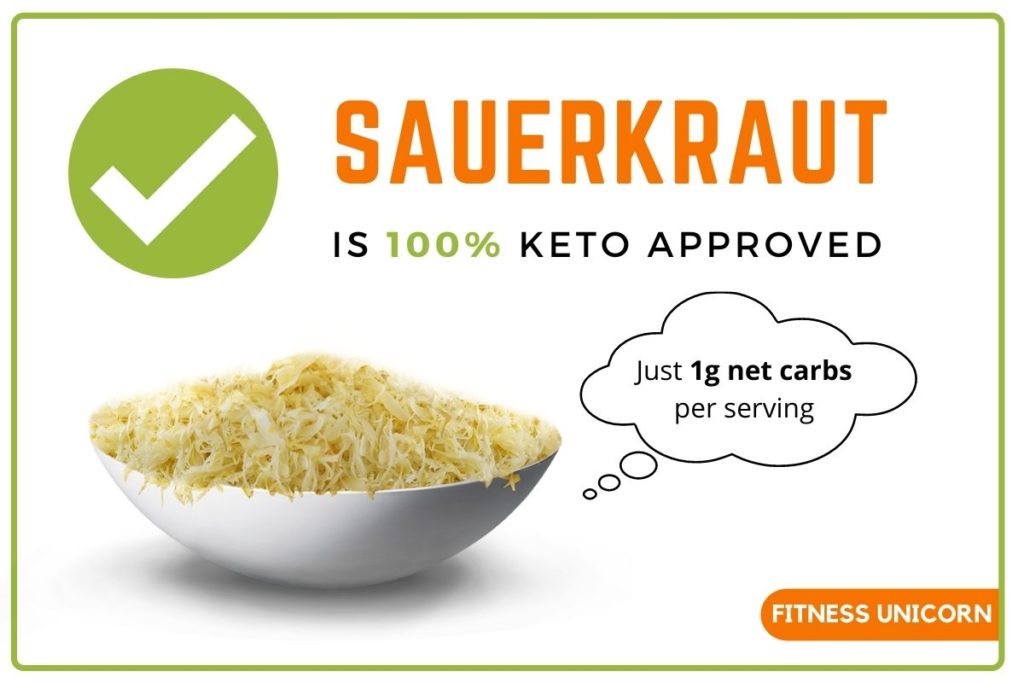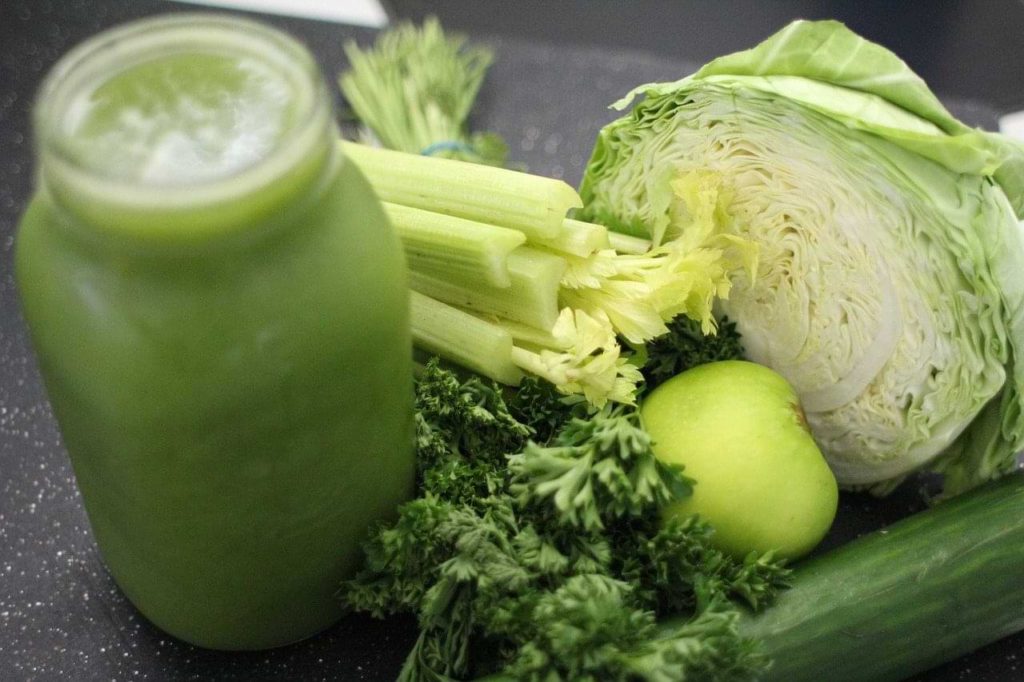Sauerkraut has a funky tangy flavor that makes it an amazing condiment. It also feels very light and healthy! But, is Sauerkraut keto?

Let’s explore how Sauerkraut fits into the keto diet, its health benefits, and how you can easily make yours at the comfort of your own home!
Is Sauerkraut Keto?
Yes, Sauerkraut is very keto friendly as it has just 2g of net carbs per cup. It is made from cabbage which is also a low carb vegetable.
And obviously, you are ever going to eat that much in one serving alone! Hence, effectively each Sauerkraut serving will have negligible carbs (i.e. less than 1).
Sauerkraut is made entirely from cabbage but has even fewer carbs. This is because, during the fermentation period, bacteria in cabbage break down the sugars into lactic acid leading to even fewer net carbs.
Sauerkraut is a very versatile snack and you can combine it with a vast variety of dishes! It is so low in carbs that it does not add any carbs to your keto recipes.
In fact, you can make your own Sauerkraut at home with just cabbage, salt, and a jar (recipe shared further down this post).
The only hard part about making Sauerkraut is patiently waiting for it to ferment! It may take up to 6 weeks for a batch to reach the perfect taste and texture.

Oh, and I almost forgot to tell you that Sauerkraut is a blessing during keto-flu!
When you’re just starting the keto diet, your body goes through a period of transition. This may cause havoc in your body for a short while!
You’ll encounter symptoms like headache, brain fog, tiredness, or feeling sick overall. Most of these symptoms are due to lack of electrolytes, especially sodium.
Since Sauerkraut is rich in sodium (thanks to salt), you’re going to have a smoother transition into ketosis. Other than that, it also contains probiotics that will keep your gut healthy!
Is Store-bought Sauerkraut Keto?
Most of the store-bought Sauerkraut is keto friendly as it is just a kind of pickle and every brand uses more or less the same recipe.
Make sure you always check the labels as I’ve noticed some variants in the market have brown sugar added to them! It may taste better but you don’t want it on the keto diet.
However, making Sauerkraut at home is such an easy process that even a 10-year-old can manage to pull it off! That’s why I always prefer it over the store-bought ones.
Here are a few more reasons to convince you:
- Sauerkraut is a very beginner-friendly recipe even if you haven’t cooked ever!
- You can save a lot of money by just making it in-house.
- You can try and experiment with different ingredients and explore new tastes (adding spices like caraway, juniper berries, or mustard seeds).
- You can use different types of cabbage (even the red ones).
Another major reason to make your own Sauerkraut at home is that YOU control what goes inside it!
Companies and businesses majorly focus on profits and hence they might use inferior ingredients to save costs.
What is Sauerkraut?
Sauerkraut is also known as pickled and fermented cabbage that quite low in carbs (hence Sauerkraut is keto friendly)!
Sauerkraut or “sour cabbage”, is shredded cabbage that has gone through the fermentation process over a few weeks. It has a sour flavor because the bacteria convert all the sugars into lactic acid during fermentation.
Sauerkraut is made through a process called Lacto-fermentation. In fact, this is the exact same process that goes into making full-fat yogurt.
Full-fat yogurt is another keto-friendly item because all of its sugars have been broken down into lactic acid, leaving it with very few net carbs!

Even though Sauerkraut is a German word, the recipe did not come from Germany. It first began in China as Suan Cai and further traveled through Europe. It has changed various names over time in different countries.
Sauerkraut is commonly known as zuurkool in Netherlands, and in France, they call it choucroute.
It is a quite traditional dish which has been used in many cultures over the course of our history.
Sauerkraut provided a lot of nutrients during the winter season when frozen foods or refrigeration was not feasible. People relied on it for their Vitamin C and sodium needs.
Sauerkraut Production Process
Sauerkraut is made through a process called lactic acid fermentation. It is similar to the process of making traditional pickled items like Kimchi.
Making sauerkraut is as easy as putting shredded cabbage in a jar with salt and leaving it for a few weeks. It can last several months at room temperature if kept in an airtight jar (I’d go for Mason jars!).
Keeping it in the fridge will also boost its shelf life. That’s why I make more than one batch at a time because waiting for 6 weeks every time is a tough job!
Did you know that the fermentation of cabbage happens in three stages? Here are the three:
- First, the bacteria in cabbage prepares a favorable environment for further growth.
- When acidity becomes high, more bacteria species take control of the process!
- Lastly, another type of bacteria ferments any remaining sugars into lactic acid.
Finally, we get our desired level of taste and texture in our Keto Sauerkraut.
While researching more about Sauerkraut on keto diet, I came across a very interesting fact!
A Dutch manufacturer found a tiny little HACK to increase the sourness of Sauerkraut to next level!
If you add some portion of old Sauerkraut while making a new batch, the resulting reactions will produce a much more sour final product!
Sauerkraut Benefits on Keto
Since Sauerkraut has such a few carbs, no doubt its a great addition to our low carb diet!
Other than it’s tangy taste and high versatility, what could be the health benefits of Sauerkraut on keto? Let’s dig in!
Rich in Nutrients
Ask any health expert and they’ll tell you how probiotics are superfoods!
Cabbage goes through fermentation where microorganisms convert its sugars into organic acid and other vital nutrients.
A well-fermented Sauerkraut has all the vital nutrients present in Kefir or Yogurt. It is rich in fiber, vitamins and minerals that also aid digestion.
Sauerkraut is much more nutritious than the raw cabbage, thanks to the presence of “good bacteria”.
Sauerkraut on Keto Improves Digestion
Consuming all that fat on keto may not be easy on your digestive system, especially if you’re a beginner!
Your gut has more trillions of bacteria and microorganisms that make up your “gut flora”.
The good bacteria present in Sauerkraut keeps your gut flora healthy and also fights against toxins and bad bacteria!
Probiotics are known to reduce gas, bloating, constipation, diarrhea, and other complicated stomach issues.
Sauerkraut is nothing but fermented cabbage! But this simple fermented cabbage has a lot of enzymes, which help break down nutrients into smaller and easily digestible particles.
Strengthens Immune System
Sauerkraut is a highly rich source of Vitamin C known for more than 2,000 years! It also has lots of probiotics and iron that together boosts your immune system.
Ayurveda says that most of your illnesses come from an unhealthy gut. Sauerkraut tackles this issue head-on by maintaining a healthy gut flora.
Think of gut flora as a preventive inner lining for your stomach. If there are leakages into the wall, unhealthy and toxic substances from food might seep in!
This is where the probiotics in Sauerkraut come into action. They strengthen your gut lining thereby preventing against harmful substances.
Various studies have found that having probiotics when sick can significantly speed up recovery!
Citrus fruits are often prescribed to those on common cold. Do you know the reason?
Well, it’s because they contain Vitamin C, which is also present in Sauerkraut!
Sauerkraut Aids Weight Loss
Having Sauerkraut on keto is like a twin-edged sword against weight loss!
Since you are already consuming high-fat and low-carb foods, ketosis will do its job and burn fat efficiently. But, Sauerkraut is also rich in fiber, which keeps you full for longer!
Feeling fuller throughout the day will prevent sudden carb cravings on keto and help you stick to the diet.
There is another way Sauerkraut on keto helps you lose more weight. It has to do something with the probiotics present inside!
Studies show that people who were given high-probiotic foods or supplements lost more weight than the placebo group.
However, there are a ton of probiotic strains and we don’t know which ones actually impact belly fat directly! So take it as a grain of salt for now.
Lowers the Stress
Did you know tha food you eat greatly impacts your mental health?
No wonder why junk food makes us so groggy and lazy, to the point of feeling sick sometimes!
Modern research has frequently proven that our gut health is connected with how we feel in general. The bacteria present in your stomach may be able to send messages to your brain!

Think of it like small musketeers pressing random buttons while sitting in your brain’s control room!
Sauerkraut provides healthy bacteria to your gut that may amplify the mood. It also increases the absorption of mood-enhancing minerals like zinc and magnesium.
Probiotics may also lower your anxiety, according to some studies.
As a side note, some compounds in Sauerkraut may mess with your anti-depressants, if you’re taking any. So it’s best to consult your doctor before adding Sauerkraut to your diet.
Fiber Promotes Heart Health
We discussed some of the greatest benefits of fiber when talking about whether Oat fiber is keto friendly.
Sauerkraut contains plenty of probiotics and fiber that reduce cholesterol levels. High levels of LDL may clog your blood vessels thereby causing hindrance in smooth blood flow.
Sauerkraut is also rich in Vitamin K2, which has been linked to better heart health. It prevents calcium from accumulating in your arteries, which may otherwise be a risky situation.
One study found that regularly consuming Vitamin K2 can lower your risk of dying from heart disease by a whopping 57%.
Sauerkraut is Good for Your Bones
Vitamin K2 activates other compounds that bind with calcium to make up your bones.
Consuming healthy amounts of calcium and Vitamin K2 in your diet boosts bone health.
Some studies found that consuming vitamin K2 supplements lowered the risk for spine, hip, and non-spine fractures by roughly 70%.
However, they were given large amounts of supplements which may not be possible for everyone.
Sauerkraut Buying Guide on Keto
There are literally tons of Sauerkraut varieties in the market based on different ingredients, taste, fermentation period, etc.
- No Pasteurization: Most of the store-bought Seauerkraut products are pasteurized which sadly, kills all the healthy bacteria present. Look for the refrigerated ones as they might be without pasteurization
- No Preservatives: Well-fermented Sauerkraut can easily last for months. However, brands add more preservatives to further increase its shelf life! You should go for the ones with minimal or no preservatives.
- Ditch the Sugar: This one is a no-brainer when it comes to lchf or keto diet! A lot of variants in the market divert from a “healthy” Sauerkraut to more taste-oriented ones. And sugar is the number one element to enhance any product! You should carefully analyse the labels and look for any hidden sugars.
There’s so much struggle in finding out the right Sauerkraut that is free from all extra stuff!
I’d rather make my own Sauerkraut at home with just cabbage, salt, and a jar at hand!
How to Make Sauerkraut at Home
Homemade Sauerkraut has a quite natural taste and texture that you’ll NEVER find in store-bought ones!
It is such a beginner-friendly recipe that it’s considered the easiest fermentation projects one can ever take.
All you have to do is take some shredded cabbage and put it in a jar along with salt!
Over time the cabbage will release liquid which turns into a brining solution. In a matter of a few weeks (depending on quantity), you’ll discover the crunchy and tangy Sauerkraut we all love!
You have to make sure that the cabbage always remains under the liquid! If you’re going in with a mason jar, put a smaller jar above the cabbage to hold it down.
FIll the smaller jar with some marbles so that it doesn’t move.
Keep the jar covered with a piece of cheesecloth for proper airflow and to prevent dust particles from ruining your recipe!
Ingredients required:
- 1 Medium sized cabbage
- 1 tbsp or 15 ml salt
Here are the step-by-step instructions for making Sauerkraut at home:
- Shred 800 grams of cabbage and put it in a bowl.
- Add salt and thoroughly mix with the cabbage until it releases some brine.
- Pack the cabbage mixture into a (1-liter) jar, along with the liquid.
- Cover the liquid surface of brine with a big cabbage leaf, so that your shreds don’t float on top.
- Put a smaller jar on top of the mixture to hold the cabbage down during fermentation.
- Cover your bigger jar with a cheesecloth to prevent dust particles and allow free flow of air.
- Let it stay for 3-4 weeks until you get the desired taste!
When putting cabbage mixture in the jar, make sure all the pieces are fully submerged to avoid growth of bad bacteria.
You can add a few shreds of garlic to enhance the flavor of your Keto Sauerkraut.
Conclusion
Is Sauerkraut Keto Friendly?
Yes, Sauerkraut is keto friendly because it has just 2g of net carbs per cup! You are likely to consume a much smaller amount that has even fewer carbs.
Sauerkraut can be a great accompanying condiment with your keto meals or snacks. It has various health benefits like improved digestion, better heart health, good for your gut and rich in nutrients.
Only buy Sauerkraut which is free from sugar, preservatives and pasteurization. Homemade Sauerkraut can be made with just some cabbage, salt and a jar!
